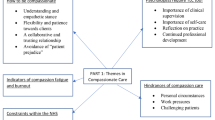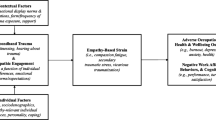Abstract
Background
Clinical settings represent the site of patient care and clinical training for medical students and residents. Both processes involve social interaction, and humor is a fundamental component of social interaction that remains underexplored in medical education. This study investigated the impact of humor on medical trainees in the context of the clinical learning environment and examined the implications for medical educators.
Methods
Following scoping review methodology, the authors systematically searched six databases and Google Scholar in February 2021 and March 2022. Articles were screened and selected according to inclusion/exclusion criteria, and findings from included articles were synthesized using procedures of metasynthesis.
Results
Fifteen articles met inclusion criteria. Six themes emerged relating to the functions and effects of humor in clinical training settings: (1) managing emotions; (2) demarcating insider vs outsider status; (3) facilitating camaraderie; (4) ensuring conformity; (5) negotiating power differentials; and (6) fostering discrimination.
Conclusions
The use of humor by medical educators plays an integral role in trainees’ everyday experiences. Positive humor helps with coping and communication, while negative humor serves as an indirect medium for communicating ridicule and prejudice. Further research drawing on social psychology theories may identify ways to reduce effects of negative humor and promote well-being and diversity in medical education.

Similar content being viewed by others
Data Availability
The scoping review data has been provided in the supplementary file.
References
Irby DM, O’Brien BC, Stenfors T, et al. Selecting instruments for measuring the clinical learning environment of medical education: a 4-domain framework. Acad Med. 2021;96(2):218–25. https://doi.org/10.1097/ACM.0000000000003551.
Gruppen LD, Irby DM, Durning SJ, et al. Conceptualizing learning environments in the health professions. Acad Med. 2019;94(7):969–74. https://doi.org/10.1097/ACM.0000000000002702.
Martin RA, Ford TE. The psychology of humor: an integrative approach. Burlington, MA: Academic Press; 2018.
Rees CE, Monrouxe LV. “A morning since eight of just pure grill”: a multischool qualitative study of student abuse. Acad Med. 2011;86(11):1374–82. https://doi.org/10.1097/ACM.0b013e3182303c4c.
Wong BO, Blythe JA, Batten JN, et al. Recognizing the role of language in the hidden curriculum of undergraduate medical education: implications for equity in medical training. Acad Med. 2021;96(6):842–7. https://doi.org/10.1097/ACM.0000000000003657.
Lingard L. Language matters: towards an understanding of silence and humour in medical education. Med Educ. 2013;47(1):40–8. https://doi.org/10.1111/medu.12098.
Strick M, Ford TE. The Social Psychology of Humor. Routledge 2021.
Watson K. Gallows humor in medicine. Hastings Cent Rep. 2011;41(5):37–45. https://doi.org/10.1002/j.1552-146x.2011.tb00139.x.
Dueñas AN, Kirkness K, Finn GM. Uncovering hidden curricula: use of dark humor in anatomy labs and its implications for basic sciences education. Med Sci Educ. 2020;30(1):345–54. https://doi.org/10.1007/s40670-019-00912-0.
Neel N, Maury JM, Heskett KM, et al. The impact of a medical improv curriculum on wellbeing and professional development among pre-clinical medical students. Med Educ Online. 2021;26(1):1961565. https://doi.org/10.1080/10872981.2021.1961565.
Gao L, Peranson J, Nyhof-Young J, et al. The role of “improv” in health professional learning: a scoping review. Med Teach. 2019;41(5):561–8. https://doi.org/10.1080/0142159X.2018.1505033.
Proyer RT, Rodden FA. Virtuous humor in health care. AMA J Ethics. 2020;22(7):615–8. https://doi.org/10.1001/amajethics.2020.615.
Dudas RA, Ryan MS, Bannister SL. A pediatrician, a resident, and a medical student walk into a clinic: the role of humor in clinical teaching. Pediatrics. 2021;148(5):e2021053044. https://doi.org/10.1542/peds.2021-053044.
Accreditation Council for Graduate Medical Education. ACGME common program requirements (residency). https://www.acgme.org/globalassets/pfassets/programrequirements/cprresidency_2022v3.pdf. Effective July 1, 2022 Accessed 27 Jan 2023.
Thomas A, Lubarsky S, Durning SJ, et al. Knowledge syntheses in medical education: demystifying scoping reviews. Acad Med. 2017;92(2):161–6. https://doi.org/10.1097/ACM.0000000000001452.
Toye F, Seers K, Allcock N, et al. Meta-ethnography 25 years on: challenges and insights for synthesising a large number of qualitative studies. BMC Med Res Methodol. 2014;14:80. https://doi.org/10.1186/1471-2288-14-80.
Thomas J, Harden A. Methods for the thematic synthesis of qualitative research in systematic reviews. BMC Med Res Methodol. 2008;8:45. https://doi.org/10.1186/1471-2288-8-45.
Nye E, Melendez-Torres GJ, Bonell C. Origins, methods and advances in qualitative meta-synthesis. Review of Education. 2016;4(1):57–79.
Costa-Drolon E, Verneuil L, Manolios E, et al. Medical students’ perspectives on empathy: a systematic review and metasynthesis. Acad Med. 2021;96(1):142–54. https://doi.org/10.1097/ACM.0000000000003655.
Glenn P. Laughter in Interaction. Cambridge University Press 2003.
Arksey H, O’Malley L. Scoping studies: towards a methodological framework. Int J Soc Res Methodol. 2005;8(1):19–32.
O’Brien KK, Colquhoun H, Levac D, et al. Advancing scoping study methodology: a web-based survey and consultation of perceptions on terminology, definition and methodological steps. BMC Health Serv Res. 2016;16(1):1–2.
Tricco AC, Lillie E, Zarin W, et al. PRISMA extension for scoping reviews (PRISMA-ScR): checklist and explanation. Ann Intern Med. 2018;169(7):467–73. https://doi.org/10.7326/M18-0850.
Lemaire JB, Wallace JE, Jovanovic A. Stress and coping: generational and gender similarities and differences. In: Figley C, Huggard P, Rees C, eds. First do no self harm: understanding and promoting physician stress resilience. Oxford University Press 2013:216–46.
Borges, NJ, MR Stephen, Elam, CL, et al. Comparing millennial and generation X medical students at one medical school. Acad Med. 2006;81(6):571–576.
Jamal F, Fletcher A, Harden A, et al. The school environment and student health: a systematic review and meta-ethnography of qualitative research. BMC Public Health. 2013;13(1):1–11.
Schütz A. Collected papers I: the problem of social reality. The Hague: Martinus Nijhoff; 1962.
Yoels WC, Clair JM. Laughter in the clinic: humor as social organization. Symb Interact. 1995;18(1):39–58.
Parsons GN, Kinsman SB, Bosk CL, et al. Between two worlds: medical student perceptions of humor and slang in the hospital setting. J Gen Intern Med. 2001;16(8):544–9. https://doi.org/10.1046/j.1525-1497.2001.016008544.x.
Wear D, Aultman JM, Varley JD, et al. Making fun of patients: medical students’ perceptions and use of derogatory and cynical humor in clinical settings. Acad Med. 2006;81(5):454–62. https://doi.org/10.1097/01.ACM.0000222277.21200.a1.
Wilkinson CE, Rees CE, Knight LV. “From the heart of my bottom”: negotiating humor in focus group discussions. Qual Health Res. 2007;17(3):411–22. https://doi.org/10.1177/1049732306298375.
Wear D, Aultman JM, Zarconi J, et al. Derogatory and cynical humour directed towards patients: views of residents and attending doctors. Med Educ. 2009;43(1):34–41. https://doi.org/10.1111/j.1365-2923.2008.03171.x.
Burack JH, Irby DM, Carline JD, et al. Teaching compassion and respect. attending physicians’ responses to problematic behaviors. J Gen Intern Med. 1999;14(1):49–55. https://doi.org/10.1046/j.1525-1497.1999.00280.x.
Wear D, Aultman JM, Borges NJ. Retheorizing sexual harassment in medical education: women students’ perceptions at five U.S. medical schools. Teach Learn Med. 2007;19(1):20–29. https://doi.org/10.1080/10401330709336619.
Hill E, Bowman K, Stalmeijer R, et al. You’ve got to know the rules to play the game: how medical students negotiate the hidden curriculum of surgical careers. Med Educ. 2014;48(9):884–94. https://doi.org/10.1111/medu.12488.
Roberts NK, Brenner MJ, Williams RG, et al. Capturing the teachable moment: a grounded theory study of verbal teaching interactions in the operating room. Surgery. 2012;151(5):643–50. https://doi.org/10.1016/j.surg.2011.12.011.
Tarrant C, Leslie M, Bion J, et al. A qualitative study of speaking out about patient safety concerns in intensive care units. Soc Sci Med. 2017;193:8–15. https://doi.org/10.1016/j.socscimed.2017.09.036.
Apker J, Eggly S. Communicating professional identity in medical socialization: considering the ideological discourse of morning report. Qual Health Res. 2004;14(3):411–29. https://doi.org/10.1177/1049732303260577.
Hinze SW. ‘Am I being over-sensitive?’ women’s experience of sexual harassment during medical training. Health. 2004;8(1):101–27. https://doi.org/10.1177/1363459304038799.
Rees CE, Monrouxe LV. “I should be lucky ha ha ha ha”: the construction of power, identity and gender through laughter within medical workplace learning encounters. J Pragmat. 2010;42(12):3384–99.
Monrouxe LV, Rees CE, Bradley P. The construction of patients’ involvement in hospital bedside teaching encounters. Qual Health Res. 2009;19(7):918–30. https://doi.org/10.1177/1049732309338583.
Wheeler M, de Bourmont S, Paul-Emile K, et al. Physician and trainee experiences with patient bias. JAMA Intern Med. 2019;179(12):1678–85. https://doi.org/10.1001/jamainternmed.2019.4122.
Hardy C. Humor and sympathy in medical practice. Med Health Care Philos. 2020;23(2):179–90.
Burson-Tolpin A. Fracturing the language of biomedicine: the speech play of US physicians. Med Anthropol Q. 1989;3(3):283–93.
Coombs RH, Chopra S, Schenk DR, et al. Medical slang and its functions. Soc Sci Med. 1993;36(8):987–98. https://doi.org/10.1016/0277-9536(93)90116-l.
Hafferty FW, Franks R. The hidden curriculum, ethics teaching, and the structure of medical education. Acad Med. 1994;69(11):861–71. https://doi.org/10.1097/00001888-199411000-00001.
Lave J, Wenger E. Situated learning: legitimate peripheral participation. Cambridge, England: Cambridge University Press; 1991.
Wenger E. Communities of practice: learning, meaning, and identity. Cambridge, England: Cambridge University Press; 1998.
Cruess RL, Cruess SR, Boudreau JD, et al. A schematic representation of the professional identity formation and socialization of medical students and residents: a guide for medical educators. Acad Med. 2015;90(6):718–25. https://doi.org/10.1097/ACM.0000000000000700.
Plester BA, Sayers J. “Taking the piss”: functions of banter in the IT industry. Humor: Int J Humor Res. 2007;20(2):157–187.
Smith III AC, Kleinman S. Managing emotions in medical school: students’ contacts with the living and the dead. Soc Psychol Q. 1989;Mar:56–69.
Volpe RL, Hopkins M, Haidet P, et al. Is research on professional identity formation biased? early insights from a scoping review and metasynthesis. Med Educ. 2019;53(2):119–32. https://doi.org/10.1111/medu.13781.
Ford TE, Ferguson MA. Social consequences of disparagement humor: a prejudiced norm theory. Pers Soc Psychol Rev. 2004;8(1):79–94. https://doi.org/10.1207/S15327957PSPR0801_4.
Mallett RK, Ford TE, Woodzicka JA. What did he mean by that? humor decreases attributions of sexism and confrontation of sexist jokes. Sex Roles. 2016;75:272–84.
Hodson G, MacInnis CC. Derogating humor as a delegitimization strategy in intergroup contexts. Translational Issues in Psychological Science. 2016;2(1):63–74.
Mallett RK, Ford TE, Woodzicka JA. Ignoring sexism increases women’s tolerance of sexual harassment. Self and Identity. 2021;20(7):913–29.
Page MJ, McKenzie JE, Bossuyt PM, et al. The PRISMA 2020 statement: an updated guideline for reporting systematic reviews. BMJ. 2021;372:n71. https://doi.org/10.1136/bmj.n71.
Acknowledgements
The authors gratefully acknowledge Ms. Cathy Pepper and Ms. Ashlynn Kogut from Texas A&M University Health Science Center for their help with the comprehensive searches of the databases and for their advice regarding scoping review methodology. The authors also wish to thank Ms. Lyndsey Raney for her assistance in compiling a large portion of the data as well as Dr. Barbara Gastel for her review of the manuscript.
Author information
Authors and Affiliations
Contributions
JTG, AH, RM, and RC undertook conceptualization of this review article. JTG, PA, and LD undertook data collection, analyzed the data, and drafted the manuscript. AH, RM, and RC revised the review critically for important intellectual content. JTG, PA, LD, RM, RC, and AH approved the final manuscript.
Corresponding author
Ethics declarations
Ethical Approval
Not applicable.
Informed Consent
Not applicable.
Conflict of Interest
The authors declare no competing interests.
Other Disclosures
None.
Additional information
Publisher's Note
Springer Nature remains neutral with regard to jurisdictional claims in published maps and institutional affiliations.
Preliminary results from an earlier version of our study were presented at the American Council of Academic Plastic Surgeons 9th Annual Winter Meeting on February 26, 2022, in Austin, TX, and subsequently published as a conference abstract in Plastic & Reconstructive Surgery – Global Open.
Supplementary Information
Below is the link to the electronic supplementary material.
Rights and permissions
Springer Nature or its licensor (e.g. a society or other partner) holds exclusive rights to this article under a publishing agreement with the author(s) or other rightsholder(s); author self-archiving of the accepted manuscript version of this article is solely governed by the terms of such publishing agreement and applicable law.
About this article
Cite this article
Garcia, J.T., DuBose, L., Arunachalam, P. et al. The Effects of Humor in Clinical Settings on Medical Trainees and the Implications for Medical Educators: A Scoping Review. Med.Sci.Educ. 33, 611–622 (2023). https://doi.org/10.1007/s40670-023-01769-0
Accepted:
Published:
Issue Date:
DOI: https://doi.org/10.1007/s40670-023-01769-0




